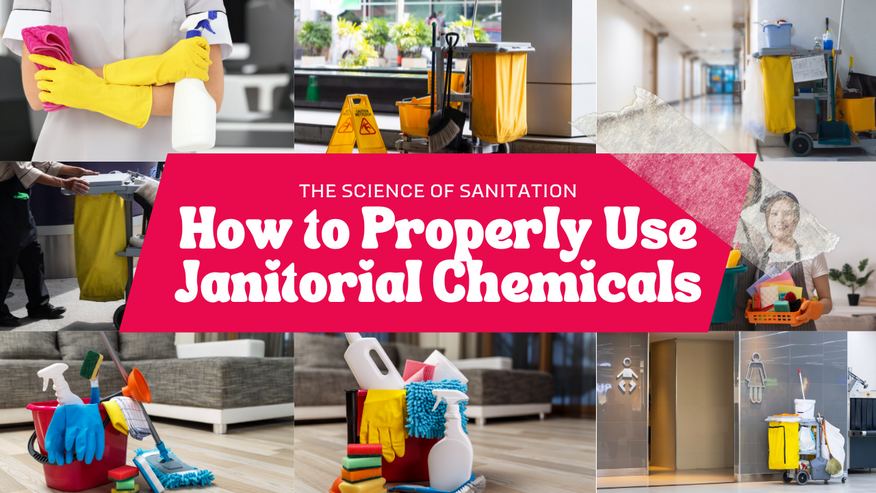Oct 19th 2023 - Team Member
The Science of Sanitation: How to Properly Use Janitorial Chemicals
In the bustling world of commercial kitchens, maintaining impeccable hygiene and cleanliness is not just an option – it's an absolute necessity. To achieve the highest standards of sanitation, it's crucial to understand the science behind cleaning, especially when it comes to the proper use of janitorial chemicals.
The Role of Janitorial Chemicals in Commercial Kitchens
In the realm of commercial kitchens, cleanliness is not a mere preference but a legal requirement. The role of janitorial chemicals is pivotal in ensuring that these spaces meet rigorous hygiene standards. These chemicals, often called cleaning agents, include a wide range of products designed for specific cleaning tasks. From sanitizing surfaces to removing stubborn stains, these chemicals are indispensable tools in the arsenal of any kitchen cleaning crew.
Understanding the Types of Janitorial Chemicals

To properly use janitorial chemicals, it's crucial to understand the various types available and their specific applications. Let's explore the most common categories:
Degreasers
One of the most common challenges in a commercial kitchen is dealing with grease and oil buildup. Degreasers are specialized chemicals designed to break down and remove grease. They're often used on kitchen hoods, grills, and other surfaces that come into contact with cooking oil.
Disinfectants and Sanitizers

In the foodservice industry, maintaining a sanitized environment is non-negotiable. Disinfectants and sanitizers kill harmful microorganisms such as bacteria and viruses. These chemicals are used on food preparation surfaces, cutting boards, and utensils to prevent cross-contamination.
Glass Cleaners
For the spotless shine of glass surfaces like windows and display cases, glass cleaners are essential. They effectively remove fingerprints, smudges, and other unsightly marks without leaving streaks.
Acidic Cleaners
Acidic cleaners are used to dissolve mineral deposits and scale buildup. They are often applied to remove hard water stains from dishwashers, coffee makers, and sinks.
All-Purpose Cleaners
As the name suggests, all-purpose cleaners are versatile and suitable for various cleaning tasks. They can effectively clean multiple surfaces in the kitchen, such as countertops, appliances, and floors.
The Science Behind Proper Use
Simply having janitorial chemicals at your disposal is not enough. To ensure your kitchen is a model of cleanliness, you must grasp the science of using these chemicals effectively. Here are some key principles:
Read Labels Carefully

Each janitorial chemical comes with specific instructions on its label. This information provides guidance on the intended use, proper dilution ratios, and safety precautions. It's essential to read and follow these directions diligently.
Dilution Matters
Most janitorial chemicals need to be diluted with water. Dilution ratios vary depending on the product and intended use. Using the correct ratio is crucial for safety and effectiveness. Failure to dilute properly can result in either an ineffective solution or one that's too harsh and may damage surfaces or pose health risks.
Contact Time
Different chemicals require different contact times to work effectively. Some need to be in contact with a surface for several minutes to kill bacteria and viruses. It's essential to follow recommended contact times for disinfectants and sanitizers to ensure they do their job.
Rinse and Dry
After applying janitorial chemicals, it's important to rinse and dry surfaces thoroughly. Residues left behind can affect the taste and safety of food. Additionally, leaving chemical residues on surfaces could lead to long-term damage.
Safety and Training

Safety should be a top priority when using janitorial chemicals. Proper training for your cleaning staff is essential. This training should include understanding the chemicals used, following safety data sheets (SDS), and using personal protective equipment (PPE) when necessary.
Conclusion
In the high-stakes world of commercial kitchens, ensuring impeccable sanitation is a science. The proper use of janitorial chemicals is a cornerstone of this science. By understanding the types of chemicals, their applications, and the science behind their proper use, you can maintain a clean and safe kitchen environment that meets regulatory standards. Remember, cleanliness isn't just a choice; it's a commitment to quality and safety in your culinary operations.

